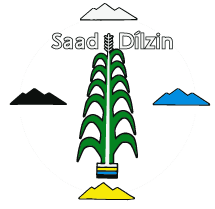Introduction to Navajo Postpositions
This is a lexicon of Navajo postpositions and postpositional enclitics.
Postpositions are pretty much the same as prepositions in English but a postposition appears after its noun phrase object rather than before it. Postpositions tend to be short words with meanings that indicate information about location, direction, or timing of an event described by the verb in the sentence, or about the kind of role played by the noun phrase in the event.
There is a relatively small number of postpositions, so by memorizing them, language learners can quickly improve their comprehension of Navajo.
This lexicon includes 14 postpositional enclitics and 75 postpositions based on Young & Morgan (1987:25-26).
In example (1), sha’áłchíní bá is a postpositional phrase, meaning ‘for my children’.
| Sha’áłchíní | bá | ch’iyáán | ’íishłaa. |
| 1-children | 3-for | food | 3-1-cook.P |
| I cooked for my children. | |||
The postposition is -á, and the pronoun prefix is b-. This is a third person prefix, which is why the gloss underneath bá has a 3 in it. The meaning of -á is ‘for’, and this is also indicated in the gloss. Also, the sh in the word sha’áłchíní, ‘my children’, is a first person pronoun prefix. This pronoun prefix also appears inside the verb ’íishłaa. Note that the gloss is 3-1-cook.P; this indicates that the word means ‘I cooked it’: 3-1 in the gloss indicates that the subject of the verb is first person (‘I’), and the object is third person (‘it’). For a guide to glossing, click here.
The first person prefix appears again on the postposition -ił (‘with’), in the example below:
| Chidí | k’asdą́ą́’ | shił | ’adah | ch’éélwod. |
| car | almost | 1-with | down | off-3-go.P |
| The car almost ran off (the road) with me. | ||||
Postpositional Enclitics do not have pronoun prefixes, and instead attach directly onto another phrase. In the example below, the enclitic is -di (‘at’). It is attached directly to Na’nízhoozhí (‘Gallup, New Mexico’). There is no pronoun prefix:
| Ch’óóshdą́ą́dą́ą́’ | Na’nízhoozhídi | kééhasht’į́ ńt’éé’. |
| formerly | Gallup-at | 1-live.I past |
| I used to live in Gallup. | ||
In the example below, the enclitic -gi is attached to the postpositional phrase tsé biká (‘on the rock’). The pronoun prefix bi- is attached to the postposition -káá (‘on’), not to the enclitic:
| Tsé | bikáa’gi | béésh | dah | si’ą́. |
| rock | 3-on-at | knife | up | 3-sit.SNP |
| The knife is on the rock. | ||||
Note that both -di and -gi are glossed as ‘at’. The enclitic -di is used for more general locations, and -gi is used for more specific ones.
The postpositional enclitics in this lexicon are, from the list in YMM (1992:938-09):
- -dą́ą́’
- past time
- -dę́ę́’
- from a general location or point in space or time, also out of, off of
- -di
- at a general location
- -dóó
- from a specific location or point in space or time
- -ę́ę-dą́ą́’ =yę́ędą́ą́’
- back when
- -gi
- at a specific location
- -góó
- to, toward, along, on, with a numeral it indicates a date
- -í-jígo
- over in the direction of the place where
- -jigo
- toward, northward
- -jí
- designates ceremonies, religious and political institutions and lifeways
- -jí
- on the side of, in the direction of, in the manner of
- -jí-k’ehgo
- in the manner of
- -jį́’
- up to, as far as
- -k’eh -jí
- in the way(s) of
The pronoun prefixes, which can appear on postpositions, are shown below:
| singular | dual-plural | |
|---|---|---|
| 1st person | shi- | nihi- |
| 2nd person | ni- | nihi- |
| 3rd person | yi-/bi- | |
| 4th person | ho- | |
| unspecified | ’a | |
| reciprocal | ’ahi- | |
| reflexive | ’ádi- | |
| area | ha-; ho-; go- | |
In using these prefixes, the final vowel sometimes changes due to the sound that comes next (e.g. shi-ałchiní → sha’áłchíní; ni- ’asdzą́ą́ → ne’asdzą́ą́; bi- ’awéé’ → be’ewéé’ / be’awéé’).
An example search has returned 50 entries
’Ashkii yázhí bee’eldǫǫh yik’ee ’ádadeeznih.
boy little gun 3-on.account.of REFL-3-hurt.PBįįh bił da’doołdǫǫh.
deer 3-with pl-2dpl-shoot.ICh’ééh jiyáán hastiin baa nahashniihgo ch’ééh ’ííł’įįd ’ahbínídą́ą́’.
watermelon man 3-from 3-1-buy.CI-GO tried in.vain 1-act.P morning-pastChidí naat’a’íísh hooghan yikáá’góó ch’éta’ ’éí doodago daats’í dził yąąhgóó ch’ét’a’?
airplane-Q house 3-over-along 3-fly.P TOP or perhaps mountain 3-over-along 3-fly.PChidí nidabinóołtłáád.
car pl-3-2dpl-stop.OChidí sits’ą́ą́’ hashtł’ish yiih yilwodgo t’áá ch’į́į́góó ch’ééh ’ííł’įįd.
car 1-from mud 3-into 3-go.P-GO failure in.vain 1-act.PDa’ chidíísh bee hólǫ́ doodaii’ ni daats’í chidí nee hólǫ́?
Q car-Q 3-with 4-exist.NI or 2 maybe car 2-with 4-exist.NIdajiyą́
pl-3DO-4dpl-eat.it.Idajííłhį́į́’
pl-3DO-4dpl-melt.it.(snow).Pdazhdíníłkaad
pl-3DO-4dpl-start.to.herd.them.(animals).Istart to herd them (animals), 4th person plural
bookmarkDibé doo deeghánígóó ’ałkéé’ ’adíítąądgo hooghanjį’ náákah.
sheep neg long.distance-neg-GO following.behind 3-in.a.line.NP-GO home-up.to return.go.IDichinísh doodaii’ dibáá’ísh jinízin?
hunger-Q or thirst-Q 3-4-want.NIdidoołhįh
3DO-2dpl-melt.it.Fdidínéeshkał
3DO-1-start.to.herd.them.(animals).Fstart to herd them (animals), 1st person singular
bookmark



